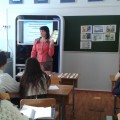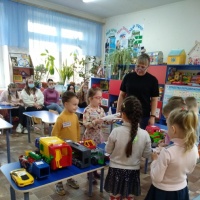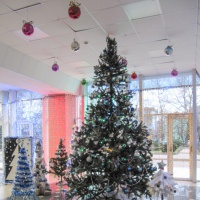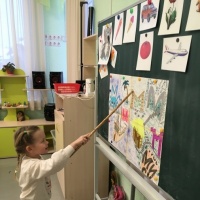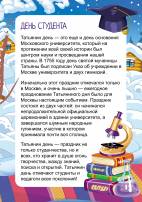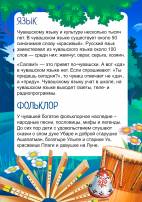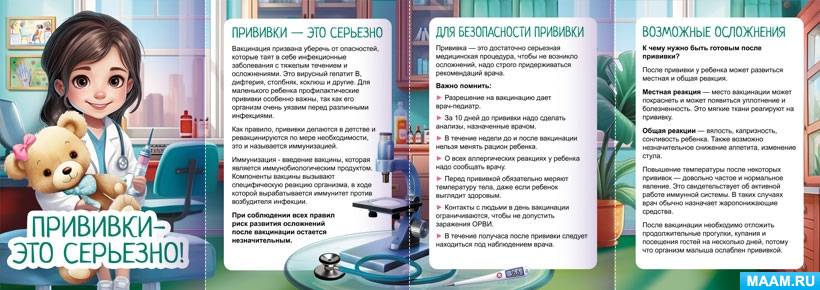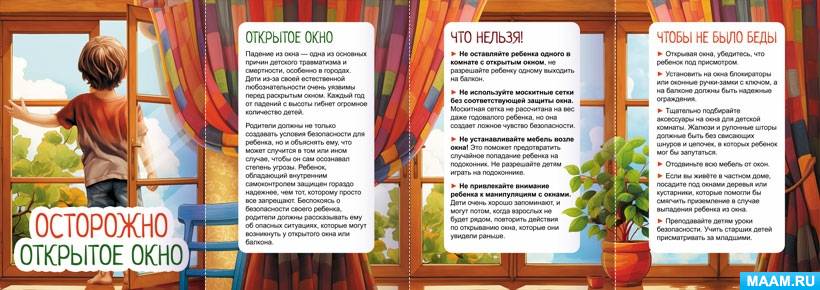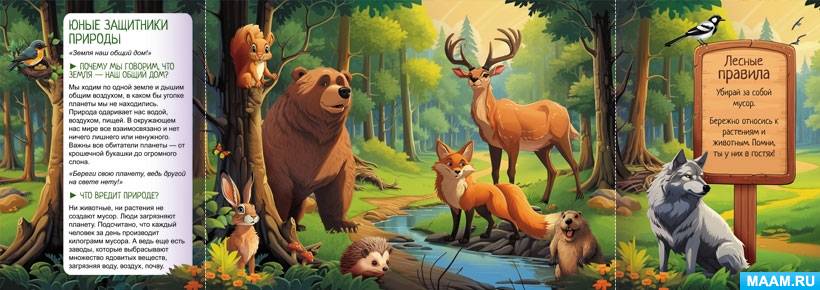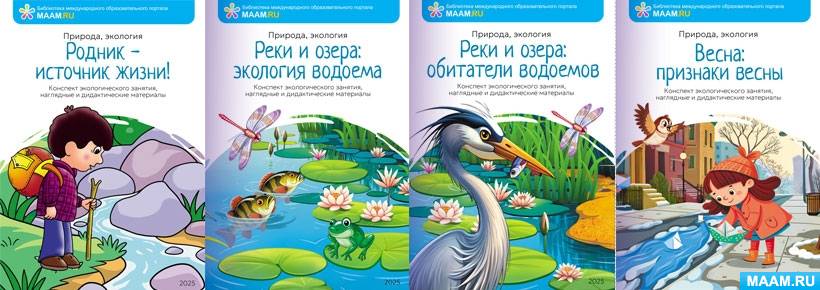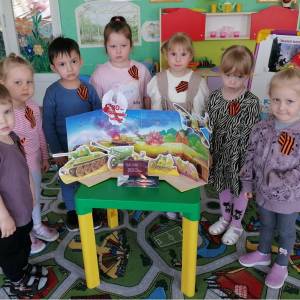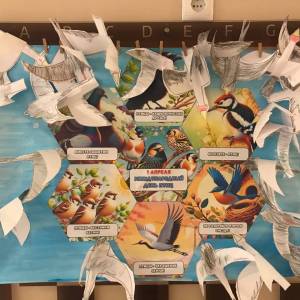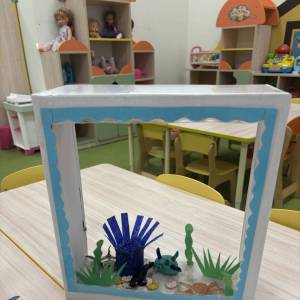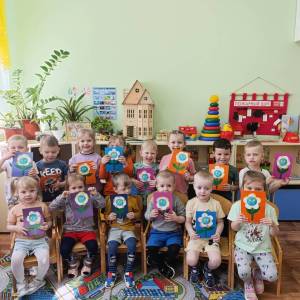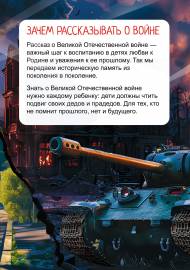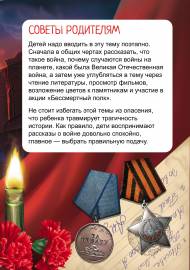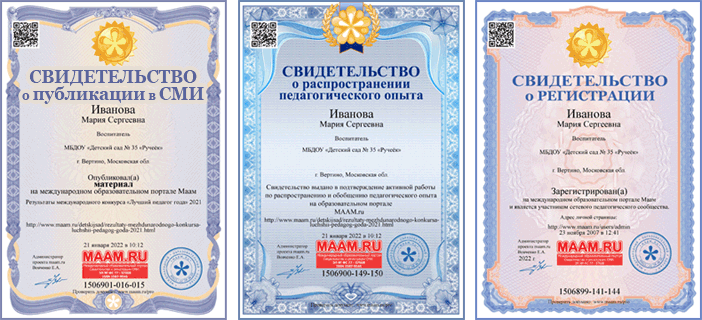![]() Иванова Лариса Александровна
Иванова Лариса Александровна
Дифференцированный зачет по дисциплине «Иностранный язык» для студентов 1 курса СПО
ПРОГРАММА
проведения промежуточной аттестации в форме дифференцированного зачета по дисциплине ОД. 06 «Иностранный язык» по профессии 08.01.25 «Мастер отделочных строительных и декоративных работ»
2024 г.
Программа рассмотрена на заседании цикловой (предметной) комиссии общеобразовательных дисциплин
Протокол № __ от «___» ___ 20__ г.
Председатель предметно-цикловой комиссии
___ / Декопова Н. С
Публикация «Дифференцированный зачет по дисциплине „Иностранный язык“ для студентов 1 курса СПО» размещена в разделах
- Иностранный язык для дошкольников
- Профессиональное педагогическое образование, студенты
- Темочки
- Конкурс для воспитателей и педагогов «Лучшая методическая разработка» сентябрь 2024
Разработчик программы: Иванова Лариса Александровна, преподаватель английского языка
1. Условия проведения дифференцированного зачёта
Форма проведения промежуточной аттестации по ОД. 06 Иностранный язык
– дифференцированный зачет.
К началу дифференцированного зачета должны быть подготовлены следующие документы:
- программа промежуточной аттестации;
- билеты;
- зачетно-экзаменационные ведомости;
- наглядные пособия, материалы справочного характера, нормативные документы и образцы техники, разрешенные к использованию на дифференцированном зачете;
- выписка из решения педагогического совета о допуске к промежуточной аттестации.
Дифференцированный зачет проводится в аудиториях колледжа.
Дифференцированный зачет состоит из теоретической и практической частей: теоретическая часть содержит 1 вопроса по грамматике, практическая часть содержит 6 практических заданий (выполнение упражнения на знание лексического материала).
Вопросы дифференцированного зачета дифференцируются по уровню сложности. Обязательная часть включает вопросы, составляющие необходимый и достаточный минимум усвоения знаний и умений в соответствии с требованиями ФГОС СПО, рабочей программы ОД. 06 Иностранный язык.
Задания дифференцированного зачета предлагаются : теоретический вопрос - в устной форме, практическое задание – в письменной форме.
Билеты дифференцированного зачета равноценны по трудности, одинаковы по структуре, параллельны по расположению заданий.
Обучающийся проходит аттестацию по выбранному им билету. В тех случаях, когда обучающийся не может изложить учебный материал, ему разрешается взять второй билет, при этом оценка за ответ снижается на один бал.
На подготовку к ответу по билету первому отвечающему предоставляется до 20 минут, на ответ - до 15 минут.
Во время дифференцированного зачета обучающиеся с разрешения преподавателя могут пользоваться наглядными пособиями и материалами, имеющимися в аудитории.
Теоретические вопросы (для первого и второго вопросов билета) направленные на проверку знаний. Другой вопрос – практическое задание направлено на проверку умений.
2. Критерии оценивания дифференцированного зачёта
В критерии оценки уровня подготовки обучающегося входят:
- уровень освоения материала, предусмотренного учебной программой по дисциплине;
- умение использовать теоретические знания при выполнении практических задач;
- обоснованность, четкость, краткость изложения ответа
- наличие у обучающего собственных суждений по проблемным вопросам темы;
- логичность изложения, убедительность представленного материала, аргументированность выводов и обобщений
Уровень подготовки обучающихся оценивается в баллах:
«5» - отлично
«4» - хорошо
«3» - удовлетворительно
«2» - неудовлетворительно
Оценка Критерии
отлично – «5» (отлично) – за глубокое и полное овладение содержанием учебного материала, в котором обучающийся свободно и уверенно ориентируется; научно-понятийным аппаратом; за умение практически применять теоретические знания, качественно выполнять все виды лабораторных и практических работ, высказывать и обосновывать свои суждения. Оценка «5» (отлично) предполагает грамотное и логичное изложение ответа (в устной или письменной форме) на практико-ориентированные вопросы; обоснование собственного высказывания с точки зрения известных теоретических положений.
хорошо – если обучающийся полно освоил учебный материал, владеет научно-понятийным аппаратом, ориентируется в изученном материале, осознанно применяет теоретические знания на практике, грамотно излагает ответ, но содержание и форма ответа имеют отдельные неточности.
удовлетворительно – если обучающийся обнаруживает знание и понимание основных положений учебного материала, но излагает его неполно, непоследовательно, допускает неточности, в применении теоретических знаний при ответе на практико-ориентированные вопросы; не умеет доказательно обосновать собственные суждения.
неудовлетворительно – если обучающийся имеет разрозненные, бессистемные знания, допускает ошибки в определении базовых понятий, искажает их смысл; не может практически применять теоретические знания.
3. Перечень вопросов и заданий
3.1. Перечень теоретических вопросов (для первого вопроса билета)
1. Личные местоимения.
2. Определенный артикль.
3. Неопределенный артикль.
4. Глагол to be. Значения как смыслового глагола и функции как вспомогательного.
5. Глагол to have Значения как смыслового глагола и функции ка вспомогательного.
6. Порядок слов в предложении.
7. Время The Present Simple, спутники и образование.
8. Конструкция с оборотом “there + to be”.
9. Множественное число существительных. Исключения из правил.
10. Виды вопросительных предложений.
11. Порядок слов в общих вопросительных предложениях.
12. Порядок слов в специальных вопросительных предложениях.
13. Числительные количественные
14. Числительные порядковые.
15. Количественные местоимения: “ little/few”,“much/many”.
16. Неопределенные местоимения.
17. Вопросительные местоимения.
18. Притяжательные местоимения.
19. Типы вопросов. Специальные вопросы.
20. Степени сравнения прилагательных, наречий.
3.2. Перечень теоретических вопросов (для второго вопроса билета)
1. My family.
2. About myself.
3. My working day.
4. My hobby.
5. My day off.
6. My flat.
7. About my free time.
8. My college.
9. My friend.
10. Eating traditions.
11. British meals.
12. My daily routine
13. My future career.
14. My friend.
15. My native town.
16. About my college life.
17. My college.
18. Shopping.
19. My favourite sport
20. Sports and games.
3.3 Практические задания
Variant I
1. Choose the correct question word.
1. It’s my mother’s birthday next week. (Who, Whose, Whom)
2. My best friend lives in Green Street. (Whom, Whose, Who)
3. Mrs. Smith is in her office. (When, Where, How)
4. I’ve got two bottles of milk at home. (How many, How much, What)
5. I see a little girl in the yard. (Who, What, Which)
2. Arrange the words into correct sentences.
1. usually / at 10 o’clock / out of the garage / in the morning / drives/ his bike / Fred
2. a shower / after dinner / often / Mrs Lewis / takes
3. a parking place / near the library / we / find / seldom
4. to / I / on / a / night-club / sometimes / Saturdays / go
5. fly / my parents / to Australia / sometimes / I / in winter / and
3. Choose the correct answer :
1. . Выберите правильный вариант местоимения:
Is there --- at home?
A) somebody
B) anybody
C) nobody
2. Употребите нужную форму глагола to be
There. not much furniture in this room.
A) is
B) are
C) am
3. Употребите нужную форму сравнения прилагательных:
This summer was --- summer of the decade.
A) the hottest
B) hot
C) hotter
4. Употребите нужную форму артикля:
My mother likes --- coffee, and I like --- milk.
A) a
B) the
C) –
5. Выберите тот вариант ответа, который считаете правильным.
I don’t know these girls. Do you know. ?
A) them
B) they
C) their
6. The weather is nice today, but it. bad yesterday.
A) were
B) is
C) was
7. In the nearest future you. to speak English.
A) to have
B) can
C) will be able
4. Translate into English :
1. Мне не нравятся эти джинсы. Мне кажется, та пара джинсов лучше.
2. Сегодня вечером я уезжаю в Бостон.
3. Мои часы отстают.
4. Она очень застенчива. У нее мало подруг.
5. Determine the tense of the verb in the sentence.
1) I have graduated from the school.
a) Past Simple; b) Future Simple; c) Past Perfect; d) Present Perfect.
2) I rarely watch TV.
a) Present Continuous; b) Past Simple; c) Present Simple; d) Present Perfect.
3) Tomorrow I am going to the cinema.
a) Present Simple; b) Past Simple; c) Future Simple; d) Present Continuous.
6. Match it up. Determine which of the texts A–F contains the answers to questions 1-7 that interest you. One in list 1–7 is extra.
1. What goods were made from the plant, the symbol of Scotland?
2. What is the national sporting event of the country?
3. What endangered plants grow in the Scottish Highlands?
4. What plant brings luck and success?
5. What is the stereotype of Scotland like?
6. Why is Scotland an attractive place for those who love sports?
7. What is the modern profile of Scotland like?
A. Thanks to television and films, Scotland is often seen by the rest of the world as a magical country, a land of misty mountains and the home of a lake creature called Nessie. This is the image most people have in mind. The truth, however, is completely different from the way the world thinks of Scotland. You may be surprised to find out that most Scots live in the lowlands and don’t believe in Nessie.
B. Scotland is much more than green hills and picturesque valleys. It’s dynamic and cosmopolitan, with a colourful history of invention and innovation. It’s the home of big businesses and a centre of new medical and scientific development. Each year, it hosts the world’s biggest contemporary arts festivals.
C. Scottish heather, a small bush with flowers, is the floral symbol of the country. The colour of the flowers usually varies from purple to lilac, but they can also be white. In the past, the Scots believed that they would never be captured by enemies and would win victories if they wore white heather. Today, when getting married, girls add white heather to bouquets to bring fortune to their family.
D. Heather has grown in Scotland as far back as its history goes. It is an essential thing for any household. Famous heather honey is rich in minerals, and was traditionally used in medicinal drinks. Traditionally dried heather was used to make perfumes, and the tough stems were used to make ropes. On many of the northern Scottish islands, heather was used in the construction of houses.
E. Scotland is an excellent destination for open-air activities all year round. Its lakes and coastline are ideal for boating and rowing and have some of the best sea-kayaking in the world. The rivers are perfect for fishing and the mountains are wonderful for hill climbing and skiing. Scotland is also good for walkers. You can enjoy easy family walks or more difficult mountain hikes.
F. The history of Scotland is rich in armed conflicts. The Scots have always valued physical power and the skills needed for battle and survival. That’s why the Highland Games were very popular. They date back to long before Scotland’s written history. The Games are still held today and include the athletic competitions in their original form as well as dancing contests. Traditional bagpipe music accompanies all the events.
Variant II
1. Choose the correct question word.
1. -… don’t you use a dictionary when you translate from Russian into English?
— I know English well. (How, What, Why)
2. You’ve got a fine collection of coins. … coin do you like best? (What, Which, Whose)
3. Mr. Black usually walks his dog early in the morning. (Where, When, How often)
4. — … does Eddy do for living? — He’s a businessman. (How, Where, What)
5. … is the weather today? — It is sunny. (What, How, Which)
2. Arrange the words into correct sentences.
1. enjoys / very much / swimming / in the pool / always / Mary
2. hardly / last year / could / skate / I
3. is / near / house / there / new / a / our / cinema
4. got / my / problems / I / with / have / home-task / some
5. well / think / your / very / I / don’t / sister / drives
3. Choose the correct answer :
1. . Выберите правильную форму числительного:
On the --- of September all children in Russia go to school.
A) one
B) second
C) first
2. Выберите английские эквиваленты для предложений:
Как поживают ваши родители?
A) Are your parents well?
B) Where are your parents?
C) How are your parents?
3. Выберите правильный вариант второй части разделительного вопроса:
My cat has not kittens, ---?
A) isn’t
B) hasn’t it
C) has it
D) does it
4. Выберите тот вариант ответа, который считаете правильным:
. invited her to stay with us in our house.
A) us
B) our
C) we
5. Исключите «лишнее» слово :
A) beach
B) apartment
C) flat
6. I watched my cat (play) with her kittens. I couldn’t tear myself away from that
funny sight.
A) played
B) playing
C) to play
7. She was so shocked that she. react at once.
A) couldn’t
B) can’t
C) have to
4. Translate into English :
1. В его переводе было мало ошибок.
2. Мне нужно купить туфли. Ты не знаешь, где здесь обувной отдел?
3. Они каждое лето ездили в Альпы.
4. Том собирается купить новый автомобиль.
5. Determine the tense of the verb in the sentence.
1) Soon I met him again, he had already passed the exam.
a) Past Simple; b) Future Simple; c) Past Perfect; d) Present Perfect.
2) I am not doing my homework now.
a) Present Continuous; b) Past Simple; c) Present Simple; d) Present Perfect.
3) I will buy a new house soon.
a) Present Simple b) Past Simple c) Future Simple d) Present Continuous
6. Match it up. Determine which of the texts A–F contains the answers to questions 1-7 that interest you. One in list 1–7 is extra.
1. Which place in London keeps a message for future generations?
2. Which place in London is good to watch sports and buy related goods?
3. How long does it take to raise the famous bridge for a ship?
4. How does a fairytale character help real people of London?
5. Which London bridge got a nickname after its reconstruction?
6. What is the most visited tourist attraction in London?
7. What were the false buildings in London made for?
A. Tower Bridge, which is over a hundred years old, has become a symbol of London. It is the only bridge on the Thames that can be raised and lowered to allow ships to pass. Nowadays it takes only 90 seconds for the heavy drawbridges to be pulled up with electric motors. It is considered that watching the Tower Bridge opening brings good luck.
B. Waterloo Bridge is a foot traffic bridge crossing the River Thames in London. It was opened in 1817, on the second anniversary of the famous battle. A century later, in the early 1940s, the famous Bridge needed to be rebuilt. It was during World War II, and most men were away fighting. So the bridge was rebuilt mainly by women. The new Waterloo Bridge was opened in 1945 and got a second name, the ‘Ladies Bridge’.
C. Wembley Stadium is a football stadium located in Wembley Park, London. The stadium is home not only to football. It also hosts concerts, rugby games and American football games. There is Wembley Market not far from the stadium. Unlike many London street markets, this one is situated in an open space. A visit here is a good option for football fans to find club T-shirts, boots or accessories.
D. 23 and 24 Leinster Gardens in Paddington (just opposite Hyde Park) are fake houses built to hide the Tube line running underneath. The windows are painted on, there are no letter boxes, and behind the facade there is a railway. The first London underground trains were steam trains so they needed ventilation. Underground lines were planned with tunnels and open-air sections so the trains could let out their steam and smoke, and that is what the house facades are hiding.
E. Great Ormond Street Hospital, which is situated at Russell Square, London, owns the copyright to Peter Pan, a story written by J.M. Barrie. The author had no children himself and gifted the rights to his famous literary pieces to the hospital in 1929. The hospital receives royalties from all films, cartoons and performances of Peter Pan. All the money is used to run the hospital.
F. Cleopatra’s Needle was brought to London in 1819 from Alexandria, the royal city of Cleopatra. Underneath Cleopatra’s Needle there’s a time capsule from 1778. It keeps information about 18th century life. It contains copies of the Bible in several languages, a portrait of Queen Victoria, a set of British coins, cigars, a razor, a map of London, copies of 10 daily newspapers and pictures of the 12 best-looking English women of the day.
Ответы
Вариант 1
Задание 1
1. Whose
2. Who
3. Where
4. How many
5. Who
Задание 2
1. Fred usually drives his bike out of the garage at 10 o’clock in the morning.
2. Lewis often takes a shower after dinner.
3. We seldom find a parking place near the library.
4. I sometimes go to a night-club on Saturdays.
5. My parents and I sometimes fly to Australia in winter.
Задание 3
1B, 2A, 3A, 4C, 5A, 6С, 7D
Задание 4
1. I don’t like these jeans. I think that pair of jeans is better.
2. I am going to Boston tonight.
3. My watch is slow.
4. She is very shy. She has few friends.
Задание 5
1D, 2C, 3D
Задание 6
A B C D E F- 574162
Вариант 2
Задание 1
1. Why
2. Which
3. When
4. What
5. How
Задание 2
1. Mary always enjoys swimming in the pool very much.
2. I could hardly skate last year.
3. There is a new cinema near our house.
4. I have got some problems with my home-task.
5. I don’t think your sister drives very well.
Задание 3
1C, 2C, 3C, 4C ,5A, 6B, 7А
Задание 4
1. There were few mistakes in his translation.
2. I want to buy a pair of shoes. Do you know where the shoe department is here?
3. They went to the Alps every summer.
4. Tom is going to buy a new car.
Задание 5
1C, 2A, 3C
Задание 6
A B C D E F – 352741

